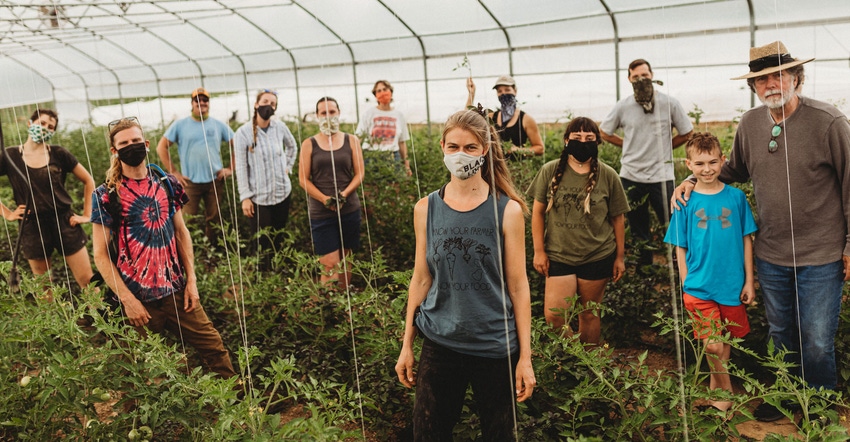
The COVID-19 pandemic created an unexpected and welcome market for farmers and growers who do more direct-farm sales or focus more on the locally grown market. But with this growth came many unexpected challenges.
MK Barnet of Open Book Farm in Middletown, Md., says her farm saw increased sales as a result of the pandemic. But the slaughterhouse where she normally takes her pigs to quickly became overwhelmed with other farmers wanting to bring animals in.
She normally calls well ahead of time to schedule slaughter times for her pigs — she normally finishes 30 head a year. This past summer, when she called about open spots for 2021, her local butcher was nearly full, and she had to schedule appointments for October 2021 in July.
Related: Complete coronavirus coverage
The lack of slaughterhouses makes it difficult to plan, Barnet says, and almost impossible to think about expansion.
“If you were to try to start a slaughter-based pasture operation, you can’t get a space,” she said during a recent webinar put on by Future Harvest CASA of Maryland. "It’s almost impossible. You might get a space, but there might be bad things happening to your meat."
Future Harvest CASA, which represents thousands of small farms that identify themselves as “sustainable” and local, says the COVID-19 pandemic revealed the potential of the locally grown market but also its limits.
They’ve teamed with the Metropolitan Washington Council of Governments and the Harry Hughes Center for Agroecology to create the Resilient Crisis-Ready Project, an effort to identify barriers to local food production and how farmers can benefit from long-term changes to consumer buying habits.
Dena Leibman, executive director of Future Harvest CASA, says it was shocking to see just how vulnerable the food system was to an unexpected event such as COVID-19. Supply chains couldn’t adjust to a rapidly changing market, leading to grocery stores having to limit purchases of staple items such as milk and butter. Several slaughterhouses had to close because of too many sick workers, leading to more supply shortages in stores.
Leibman says this project is different in that the organization is crowdsourcing ideas from farmers on what issues they want addressed, and then making the “idea dump” an open source for any stakeholder to act on.
"Already, we're seeing a big call for slaughterhouse capacity. Some people are having to wait more than a year to get into a slaughterhouse,” she says. “Our farmers are still experiencing huge demand. They have a new tranche of customers through the pandemic. The question is, will these customers be loyal?"
Some of the ideas they’ve gotten so far:
Create policies and programs to encourage shortened supply chains for staples such as flour, meats and produce.
Create a separate, size- and sector-appropriate regulatory arena for small- to midscale fruit, vegetable, meat and grain production.
Reinstitute and update ag education in the K-12 curriculum.
Create policies that encourage interstate commerce of local products and harmonization of regulations.
Launch consumer education programs to keep demand strong for local produce.
Long-standing problems
William Morrow, the former owner of Whitmore Farms, is now retired and living in Florida with his husband. Before retiring, he and his husband purchased a 28-acre farm in Frederick County, Md., in 2003, a parcel that hadn’t been farmed in 40 years.
The couple got an organic certification for lamb and goat production, and Morrow claims that the farm was the first in the state to get an organic certification for this.
They eventually let their certification expire because, as he recalls, the paperwork was burdensome and time-consuming. Plus, he saw that his wholesale and retail clients were satisfied with the farm’s practices and didn’t think organic certification was necessary.
They had $12,000 in gross sales in the first year of business, and at its peak, the farm grossed $425,000 a year in revenue.
Toward the end, Morrow says that it was too much work without enough profit. He and his husband invested their nonfarm income to get the business going, and the farm eventually made enough money to pay all of it back. The couple’s goal was for the farm to become economically self-sustaining, but it never got to that point.
"So then it became what I call a lifestyle career," he says. As they got older, they decided that it wasn’t worth it anymore, and they sold the farm.
Looking back, Morrow says that a regulatory overhaul could’ve helped his farm survive longer. The permitting and paperwork that he had to do was designed for much larger farms, he says, and he didn’t have the resources to keep up with those demands. He says that regulatory oversight should be commensurate with the risk posed by each operation.
Idea dump
Farmers who want to participate and have their voices heard can visit surveymonkey.com. Although it says that ideas should be shared by Nov. 15, Leibman says the organization is taking suggestions through the end of the year. A report will be made available during Future Harvest CASA’s virtual winter conference from Jan. 14 to 16.
“We're just at the beginning of getting all these ideas," she says. "The idea dump is available online. It's been working really well so far."
For more information, visit futureharvestcasa.org.
Read more about:
Covid 19About the Author(s)
You May Also Like






